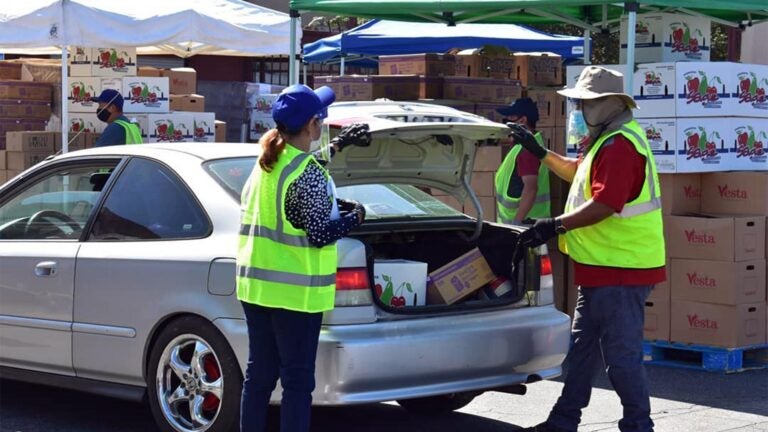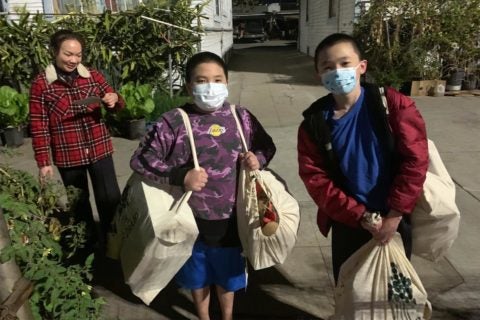
Volunteers from the USC Leslie and William McMorrow Neighborhood Academic Initiative assist with food distribution at St. Agnes Catholic Church. (Photo/Michael Morales)
Unsung heroes keep kids and families together in neighborhoods around USC
As the pandemic began to threaten people’s lives and their livelihoods, USC’s Neighborhood Academic Initiative staff stepped in to help.
While many schoolchildren in Los Angeles were trying to keep up with remote classes this winter, several kids in a USC college prep program faced deeper struggles: They lost their mom or dad to COVID-19.
In January, the coronavirus claimed the lives of three parents whose children are enrolled in the USC Leslie and William McMorrow Neighborhood Academic Initiative, or NAI, which helps kids from South Los Angeles and the Eastside get to college. In each case, the parent was the family’s primary breadwinner. The sudden deaths left those families without their main source of income — and in grief.
But the families weren’t totally alone. USC staff working with the students through NAI swept in to help.
“They could lose their homes. They definitely need support with funding for the basics, and that’s where NAI springs into action,” said Kim Thomas-Barrios, USC’s associate senior vice president of educational partnerships.
During COVID-19, NAI staff have seen an unprecedented rise in demand for services from children and their families. This pandemic has underscored how much NAI supports students’ entire families, not just the students’ education.
USC’s NAI staff adapt as the pandemic overwhelms families
For seven years, NAI students commit to attend Saturday and weekday morning classes. Students who complete the program and meet admission requirements get a scholarship to USC. About 1,000 students participate in NAI every year, at no cost to them.
They definitely need support with funding for the basics, and that’s where NAI springs into action.
Kim Thomas-Barrios
Although the program primarily focuses on students, experts realize that having a stable home environment produces the best outcomes. As such, the initiative also offers services for the family. While NAI students take classes, their parents attend biweekly workshops. The parents’ sessions cover topics like how to develop an effective learning environment in the home. During the pandemic, sessions also include timely topics such as avoiding unlawful eviction, as well as how to access pandemic relief for renters and homeowners.
NAI staff also now help with basic needs, ensuring that families have food, clothes, diapers, health care and technology for distance learning. NAI staff may even need to make sure students have a home where they can sleep and study.
Thomas-Barrios’ team has responded to this increased demand for services at the same time they shifted all their workshops and classes online.

Families in the NAI program have been among the hardest hit by the pandemic. Data from Los Angeles County shows that the southern and eastern parts of Los Angeles have had more COVID-19 cases and deaths than other parts of the county. Additionally, many of the people who are connected to the program work in industries that have been crippled by the pandemic, like hotels, retail and restaurants.
Fortunately, NAI staff already had experience with connecting families to services. They’ve been doing that since the initiative started in the 1990s.
“It was more of an expansion of our focus,” said Ivonne Rodriguez, project specialist.
From Zoom assistance to mental health support, NAI specialists provide guidance
Staff set up a food pantry, coordinated with nonprofits to make sure families received baby supplies and worked with schools to ensure students had laptops once their schools closed.
Their team of social workers and counselors noticed more students and families struggling with mental health. One silver lining from this year has been that families are more open to seeking mental health services than before the pandemic. NAI hired additional staff to meet this demand, and the program offers free mental health services to anyone who lives in the student’s household.
Family issues range from stress over the pandemic, financial strain from job loss or pressure to maintain good grades. Some feel isolated because they have trouble accessing technology like computers and smartphones and that keeps them from connecting with others, said Ericka Paez, who supervisors NAI’s counselors and clinical social workers.
NAI has Spanish-speaking counselors, she added, but some stigmas about seeking mental health services still hold some people back. Some NAI family members don’t speak English or are still using flip phones, so they’ve shied away from digital platforms. That may keep them from talking to counselors remotely.
“A lot of times, I would say, ‘Let’s have a phone call first,’” she said.
Video communications platforms like Zoom are also a barrier to those who have never used them.
“What some people have told me is, ‘I’m so embarrassed. I don’t want you to feel like I’m not participating, but I don’t know how to do that.’” Rodriguez said. “They don’t know how to type something on the chat box.”
Project specialist Yolanda McCoy gives parents step-by-step tutorials on how to use Zoom so they can stay connected to their child’s school and the NAI parent workshops. She usually calls parents individually and tells them which buttons to push or click.
Despite COVID-19 challenges, NAI students look to a brighter tomorrow
USC NAI staff also have seen other challenges that underscore families’ needs and vulnerability during the pandemic.
To have 90% of 900 kids online — on a Saturday, mind you — is a miracle.
Thomas-Barrios
For example, one high school senior failed to show up to online sessions during winter. He was cagey when asked why. Later, NAI staff learned that the student had been living in a tent outside his house because his parents and grandparents were afraid of getting COVID-19 — and the teen had nowhere else to sleep. NAI staff stepped in to help.
Despite these challenges, the students and families have also inspired NAI staff through their perseverance.
“To have 90% of 900 kids online — on a Saturday, mind you — is a miracle,” Thomas-Barrios said, “and it speaks to their resilience.”
Before each Saturday prep session with students, Thomas-Barrios shares an inspirational quote and reminds them of why they’re there. During one session, she told the students that it may be hard to find motivation when the world seems to have closed due to the pandemic.
“Here’s the thing,” she remembers telling the students. “Your future is still here for you, and what we’re going to do is take every step to ensure that you are ready for your future. That’s job number one; that’s why we are here today.”
The pandemic will end, she promised them, “so we’re going to continue to work toward that bright future that each of you have.”



